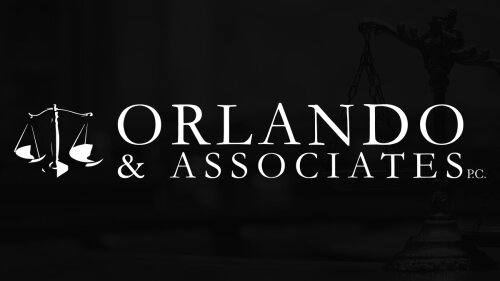Best General Litigation Lawyers in Virginia
Share your needs with us, get contacted by law firms.
Free. Takes 2 min.
Or refine your search by selecting a city:
List of the best lawyers in Virginia, United States
About General Litigation Law in Virginia, United States
General Litigation in Virginia covers a broad spectrum of legal disputes that arise between individuals, businesses, or government entities. This area of law addresses civil matters-meaning cases that do not involve criminal charges. Litigation can occur in state or federal courts located in Virginia, and it encompasses a wide variety of issues such as contract disputes, personal injury claims, property matters, business disagreements, landlord-tenant issues, and more. The primary purpose of General Litigation is to resolve disputes through the legal system, which may result in settlements, court orders, or monetary judgments.
Why You May Need a Lawyer
There are numerous situations where seeking legal assistance with General Litigation in Virginia can be vital:
- You are being sued by another party over a business deal, property dispute, or personal injury.
- You need to file a lawsuit against someone who owes you money, breached a contract, or caused harm to you or your property.
- You have been served with legal documents and are unsure about your rights and obligations.
- A business or partnership disagreement has escalated to the courts.
- You are involved in a dispute with a landlord or tenant that cannot be resolved without legal intervention.
- You wish to challenge a decision made by a local government or administrative agency.
- You want to appeal a judgment from a lower court.
- Negotiation attempts have failed, and you require representation in settlement discussions or mediation.
An attorney can help you understand the complexities of Virginia’s legal system, navigate procedural requirements, protect your rights, and increase your chances of a favorable outcome.
Local Laws Overview
General Litigation in Virginia is governed by a combination of state statutes, court rules, and case law. Here are some key aspects:
- Court System: Virginia has a tiered court system, consisting of General District Courts (handling most civil cases up to $25,000), Circuit Courts (handling higher-dollar cases and appeals from lower courts), and appellate courts.
- Statutes of Limitations: There are strict deadlines for filing different types of lawsuits. For example, personal injury claims generally must be filed within two years, while written contract disputes typically have a five-year limit.
- Pleadings and Filing Requirements: Virginia courts have specific rules for how lawsuits must be initiated, served, and proceeded with. Failure to comply can result in a case being dismissed.
- Discovery Process: Both parties exchange information through a legal process called discovery. This includes depositions, interrogatories, and requests for documents.
- Alternative Dispute Resolution: Many courts encourage or require mediation or arbitration before a case goes to trial.
- Appeals: If you lose your case, you generally have the right to appeal to a higher court, subject to specific time limits and procedural requirements.
Understanding these local laws and procedural rules is essential for managing litigation effectively in Virginia.
Frequently Asked Questions
What is General Litigation?
General Litigation involves resolving disputes between parties in civil court, covering a wide range of non-criminal legal matters such as contract breaches, property disputes, and personal injury claims.
Do I have to go to court if I am involved in litigation in Virginia?
Not all litigation results in a courtroom trial. Many disputes settle out of court through negotiations or alternative dispute resolution methods like mediation or arbitration.
How long do I have to file a lawsuit in Virginia?
The time limits, known as statutes of limitations, vary by case type. Personal injury cases usually have a two-year deadline, while contract cases may have up to five years.
What happens if I miss a filing deadline?
If you miss the statute of limitations or other critical deadlines, your case may be dismissed, and you could lose your right to pursue the claim.
Can I represent myself in court?
Yes, individuals can represent themselves, known as appearing pro se, but the legal process can be complex. A lawyer can help navigate court procedures and improve your case's chances.
What is discovery in litigation?
Discovery is the phase where both sides exchange relevant information, allowing each party to gather facts, documents, and witness statements to build their cases.
Can I recover attorneys’ fees if I win my case?
Generally, each party pays their own legal fees, unless a statute or contract provides otherwise. Certain cases or agreements may allow for fee-shifting.
What if I cannot afford a lawyer?
Some organizations offer free or reduced-cost legal services to eligible individuals. In some cases, pro bono programs or legal aid might assist.
What is mediation, and do I have to participate?
Mediation is a process where a neutral third party helps disputing parties reach a settlement. Virginia courts often encourage or require mediation before trial.
How do appeals work in Virginia litigation?
If you disagree with a court's decision, you may appeal to a higher court, but you must follow detailed procedures and strict deadlines to do so successfully.
Additional Resources
Several resources are available in Virginia to help those dealing with general litigation issues:
- Virginia State Bar - Provides information on finding and working with attorneys in Virginia.
- Virginia Legal Aid Society - Offers legal assistance for eligible low-income residents.
- Virginia Courts Self-Help - Resources for self-represented litigants, including forms and procedural guides.
- Local Circuit and General District Courts - Offer information on court procedures and public records.
- Local law libraries - Provide access to legal research materials and sometimes reference help.
Next Steps
If you are facing a legal dispute or have questions about General Litigation in Virginia, consider the following steps:
- Gather all relevant documents and facts related to your dispute.
- Determine important deadlines, such as the statute of limitations.
- Contact a qualified attorney familiar with general litigation in Virginia for a consultation and initial case evaluation.
- Explore local resources, such as the Virginia Legal Aid Society or your local bar association, especially if you have financial limitations.
- Prepare a list of questions and concerns for your initial meeting with a lawyer.
- Follow your attorney’s advice and stay informed about case developments.
Taking proactive steps early in the process helps to protect your rights and position your case for the best possible outcome.
Lawzana helps you find the best lawyers and law firms in Virginia through a curated and pre-screened list of qualified legal professionals. Our platform offers rankings and detailed profiles of attorneys and law firms, allowing you to compare based on practice areas, including General Litigation, experience, and client feedback.
Each profile includes a description of the firm's areas of practice, client reviews, team members and partners, year of establishment, spoken languages, office locations, contact information, social media presence, and any published articles or resources. Most firms on our platform speak English and are experienced in both local and international legal matters.
Get a quote from top-rated law firms in Virginia, United States — quickly, securely, and without unnecessary hassle.
Disclaimer:
The information provided on this page is for general informational purposes only and does not constitute legal advice. While we strive to ensure the accuracy and relevance of the content, legal information may change over time, and interpretations of the law can vary. You should always consult with a qualified legal professional for advice specific to your situation.
We disclaim all liability for actions taken or not taken based on the content of this page. If you believe any information is incorrect or outdated, please contact us, and we will review and update it where appropriate.
Browse general litigation law firms by city in Virginia
Refine your search by selecting a city.









